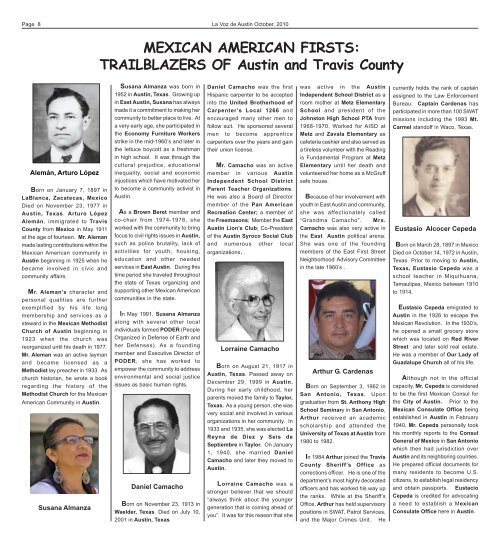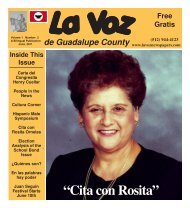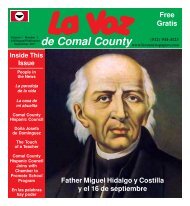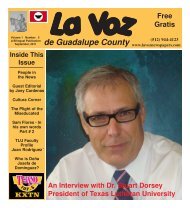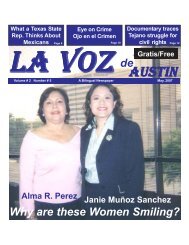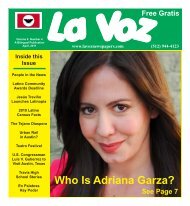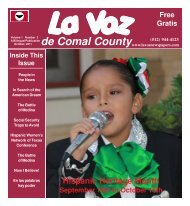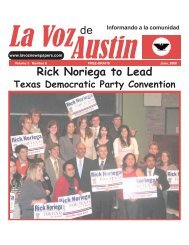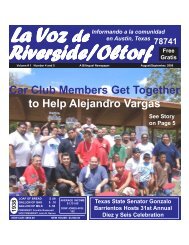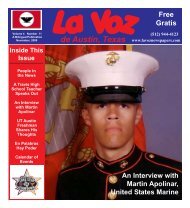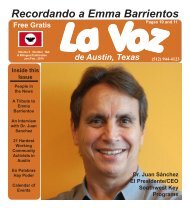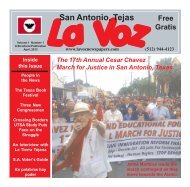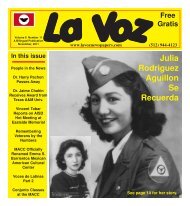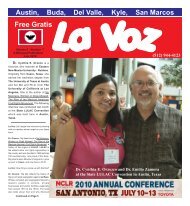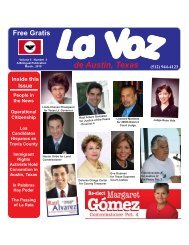La Voz de Austin October 2010abc.pmd - La Voz Newspapers
La Voz de Austin October 2010abc.pmd - La Voz Newspapers
La Voz de Austin October 2010abc.pmd - La Voz Newspapers
You also want an ePaper? Increase the reach of your titles
YUMPU automatically turns print PDFs into web optimized ePapers that Google loves.
Page 8 <strong>La</strong> <strong>Voz</strong> <strong>de</strong> <strong>Austin</strong> <strong>October</strong>, 2010<br />
MEXICAN AMERICAN FIRSTS:<br />
TRAILBLAZERS OF <strong>Austin</strong> and Travis County<br />
Alemán, Arturo López<br />
Born on January 7, 1897 in<br />
<strong>La</strong>Blanca, Zacatecas, Mexico<br />
Died on November 23, 1977 in<br />
<strong>Austin</strong>, Texas. Arturo López<br />
Alemán, immigrated to Travis<br />
County from Mexico in May 1911<br />
at the age of fourteen. Mr. Aleman<br />
ma<strong>de</strong> lasting contributions within the<br />
Mexican American community in<br />
<strong>Austin</strong> beginning in 1925 when he<br />
became involved in civic and<br />
community affairs.<br />
Mr. Aleman’s character and<br />
personal qualities are further<br />
exemplified by his life long<br />
membership and services as a<br />
steward in the Mexican Methodist<br />
Church of <strong>Austin</strong> beginning in<br />
1923 when the church was<br />
reorganized until his <strong>de</strong>ath in 1977.<br />
Mr. Aleman was an active layman<br />
and became licensed as a<br />
Methodist lay preacher in 1933. As<br />
church historian, he wrote a book<br />
regarding the history of the<br />
Methodist Church for the Mexican<br />
American Community in <strong>Austin</strong>.<br />
Susana Almanza<br />
Susana Almanza was born in<br />
1952 in <strong>Austin</strong>, Texas. Growing up<br />
in East <strong>Austin</strong>, Susana has always<br />
ma<strong>de</strong> it a commitment to making her<br />
community to better place to live. At<br />
a very early age, she participated in<br />
the Economy Furniture Workers<br />
strike in the mid-1960’s and later in<br />
the lettuce boycott as a freshman<br />
in high school. It was through the<br />
cultural prejudice, educational<br />
inequality, social and economic<br />
injustices which have motivated her<br />
to become a community activist in<br />
<strong>Austin</strong>.<br />
As a Brown Beret member and<br />
co-chair from 1974-1978, she<br />
worked with the community to bring<br />
focus to civil rights issues in <strong>Austin</strong>,<br />
such as police brutality, lack of<br />
activities for youth, housing,<br />
education and other nee<strong>de</strong>d<br />
services in East <strong>Austin</strong>. During this<br />
time period she traveled throughout<br />
the state of Texas organizing and<br />
supporting other Mexican American<br />
communities in the state.<br />
In May 1991, Susana Almanza<br />
along with several other local<br />
individuals formed PODER (People<br />
Organized in Defense of Earth and<br />
her Defenses). As a founding<br />
member and Executive Director of<br />
PODER, she has worked to<br />
empower the community to address<br />
environmental and social justice<br />
issues as basic human rights.<br />
Daniel Camacho<br />
Born on November 23, 1913 in<br />
Wael<strong>de</strong>r, Texas. Died on July 10,<br />
2001 in <strong>Austin</strong>, Texas<br />
Daniel Camacho was the first<br />
Hispanic carpenter to be accepted<br />
into the United Brotherhood of<br />
Carpenter’s Local 1266 and<br />
encouraged many other men to<br />
follow suit. He sponsored several<br />
men to become apprentice<br />
carpenters over the years and gain<br />
their union license.<br />
Mr. Camacho was an active<br />
member in various <strong>Austin</strong><br />
In<strong>de</strong>pen<strong>de</strong>nt School District<br />
Parent Teacher Organizations.<br />
He was also a Board of Director<br />
member of the Pan American<br />
Recreation Center; a member of<br />
the Freemasons; Member the East<br />
<strong>Austin</strong> Lion’s Club; Co-Presi<strong>de</strong>nt<br />
of the <strong>Austin</strong> Syroco Social Club<br />
and numerous other local<br />
organizations.<br />
Lorraine Camacho<br />
Born on August 21, 1917 in<br />
<strong>Austin</strong>, Texas. Passed away on<br />
December 29, 1999 in <strong>Austin</strong>.<br />
During her early childhood, her<br />
parents moved the family to Taylor,<br />
Texas. As a young person, she was<br />
very social and involved in various<br />
organizations in her community. In<br />
1933 and 1935, she was elected <strong>La</strong><br />
Reyna <strong>de</strong> Diez y Seis <strong>de</strong><br />
Septiembre in Taylor. On January<br />
1, 1940, she married Daniel<br />
Camacho and later they moved to<br />
<strong>Austin</strong>.<br />
Lorraine Camacho was a<br />
stronger believer that we should<br />
“always think about the younger<br />
generation that is coming ahead of<br />
you”. It was for this reason that she<br />
was active in the <strong>Austin</strong><br />
In<strong>de</strong>pen<strong>de</strong>nt School District as a<br />
room mother at Metz Elementary<br />
School and presi<strong>de</strong>nt of the<br />
Johnston High School PTA from<br />
1968-1970. Worked for AISD at<br />
Metz and Zavala Elementary as<br />
cafeteria cashier and also served as<br />
a tireless volunteer with the Reading<br />
is Fundamental Program at Metz<br />
Elementary until her <strong>de</strong>ath and<br />
volunteered her home as a McGruff<br />
safe house.<br />
Because of her involvement with<br />
youth in East <strong>Austin</strong> and community,<br />
she was affectionately called<br />
“Grandma Camacho”. Mrs.<br />
Camacho was also very active in<br />
the East <strong>Austin</strong> political arena.<br />
She was one of the founding<br />
members of the East First Street<br />
Neighborhood Advisory Committee<br />
in the late 1960’s .<br />
Arthur G. Car<strong>de</strong>nas<br />
Born on September 3, 1962 in<br />
San Antonio, Texas. Upon<br />
graduation from St. Anthony High<br />
School Seminary in San Antonio,<br />
Arthur received an aca<strong>de</strong>mic<br />
scholarship and atten<strong>de</strong>d the<br />
University of Texas at <strong>Austin</strong> from<br />
1980 to 1982.<br />
In 1984 Arthur joined the Travis<br />
County Sheriff’s Office as<br />
corrections officer. He is one of the<br />
<strong>de</strong>partment’s most highly <strong>de</strong>corated<br />
officers and has worked his way up<br />
the ranks. While at the Sheriff’s<br />
Office, Arthur has held supervisory<br />
positions in SWAT, Patrol Services,<br />
and the Major Crimes Unit. He<br />
currently holds the rank of captain<br />
assigned to the <strong>La</strong>w Enforcement<br />
Bureau. Captain Car<strong>de</strong>nas has<br />
participated in more than 100 SWAT<br />
missions including the 1993 Mt.<br />
Carmel standoff in Waco, Texas.<br />
Eustasio Alcocer Cepeda<br />
Born on March 28, 1897 in Mexico<br />
Died on <strong>October</strong> 14, 1972 in <strong>Austin</strong>,<br />
Texas. Prior to moving to <strong>Austin</strong>,<br />
Texas, Eustasio Cepeda was a<br />
school teacher in Miquihuana,<br />
Tamaulipas, Mexico between 1910<br />
to 1914.<br />
Eustasio Cepeda emigrated to<br />
<strong>Austin</strong> in the 1926 to escape the<br />
Mexican Revolution. In the 1930’s,<br />
he opened a small grocery store<br />
which was located on Red River<br />
Street and later sold real estate.<br />
He was a member of Our <strong>La</strong>dy of<br />
Guadalupe Church all of his life.<br />
Although not in the official<br />
capacity, Mr. Cepeda is consi<strong>de</strong>red<br />
to be the first Mexican Consul for<br />
the City of <strong>Austin</strong>. Prior to the<br />
Mexican Consulate Office being<br />
established in <strong>Austin</strong> in February<br />
1940, Mr. Cepeda personally took<br />
his monthly reports to the Consul<br />
General of Mexico in San Antonio<br />
which then had jurisdiction over<br />
<strong>Austin</strong> and its neighboring counties.<br />
He prepared official documents for<br />
many resi<strong>de</strong>nts to become U.S.<br />
citizens, to establish legal resi<strong>de</strong>ncy<br />
and obtain passports. Eustacio<br />
Cepeda is credited for advocating<br />
a need to establish a Mexican<br />
Consulate Office here in <strong>Austin</strong>.


